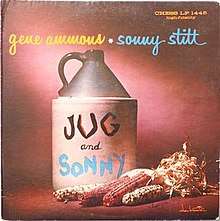Jug and Sonny
Jug and Sonny is a compilation album by saxophonist Gene Ammons, with Sonny Stitt featured on two tracks, collecting recordings made between 1948 and 1951, some of which were originally released as singles, that was issued by the Chess label in 1960.[1][2][3]
| Review scores | |
|---|---|
| Source | Rating |
| AllMusic | |
| Jug and Sonny | ||||
|---|---|---|---|---|
 | ||||
| Compilation album by | ||||
| Released | 1960 | |||
| Recorded | October 12, 1948, February 28, 1949, January 8, 1950, May 2, 1950, August, 1950 and May 3, 1951 | |||
| Studio | Chicago, Illinois | |||
| Genre | Jazz | |||
| Length | 27:52 | |||
| Label | Chess LP 1445 | |||
| Gene Ammons chronology | ||||
| ||||
Track listing
All compositions by Gene Ammons except where noted
- "You're Not The Kind of a Girl" (Will Hudson) – 2:40
- "I Cover the Waterfront" (Johnny Green, Edward Heyman) – 2:37
- "Full Moon" – 2:40
- "Jam for Boppers" – 5:03
- "Don't Do Me Wrong" (Jimmy Mundy) – 2:47
- "Don't Worry About Me" (Rube Bloom, Ted Koehler) – 2:40
- "Baby, Won't You Please Say Yes" (John Burton) – 2:44
- "Cha Bootie" (Jimmy Mundy) – 2:47
- "Tenor Eleven" – 2:50
- "The Last Mile" – 2:44
- Recorded in Chicago on October 12, 1948 (track 4), January 8, 1950 (tracks 3, 8 & 10), May 2, 1950 (track 9), August, 1950 (track 5) and May 3, 1951 (tracks 1, 2, 6 & 7)
Personnel
- Gene Ammons – tenor saxophone (tracks 1, 3–5 & 7–10)
- Sonny Stitt – tenor saxophone, baritone saxophone (tracks 1, 2 & 6)
- Bill Massey (tracks 5 & 9), Jesse Miller (tracks 3, 8 & 10) – trumpet
- Matthew Gee – trombone (tracks 3, 5 & 8–10)
- Tom Archia – tenor saxophone (track 4)
- Charlie Bateman (tracks 5 & 9), Junior Mance (tracks 1–3, 6–8 & 10) – piano
- Christine Chatman – piano, vocal (track 4)
- Leo Blevins – guitar (tracks 3, 8 & 10)
- Leroy Jackson (tracks 3, 4, 8 & 10), Gene Wright (tracks 1, 2, 5–7 & 9) – bass
- Wesley Landers (tracks 3–5 & 8–10), Teddy Stewart (tracks 1, 2, 6 & 7) – drums
gollark: * rustaceality
gollark: This was actually obsoleted by the revised apiolectromagnetic equations.
gollark: It has to be, to generate implausibly optimized machine code from *Haskell*.
gollark: Yes.
gollark: Unlike GHC, which merely creates portals to hell in order to [REDACTED] compiler optimization via literal demons.
References
- Both Sides Now: Chess Album Discography, Part 1: LP-1425 to LPS-1553 and CHV-400 Vintage Series accessed August 21, 2019
- Jazzdisco: Gene Ammons Catalog accessed August 21, 2019
- Jazzlists: Gene Ammons discography accessed August 21, 2019
- Gene Ammons / Sonny Stitt: Jug & Sonny – Review at AllMusic. Retrieved August 22, 2019.
This article is issued from Wikipedia. The text is licensed under Creative Commons - Attribution - Sharealike. Additional terms may apply for the media files.